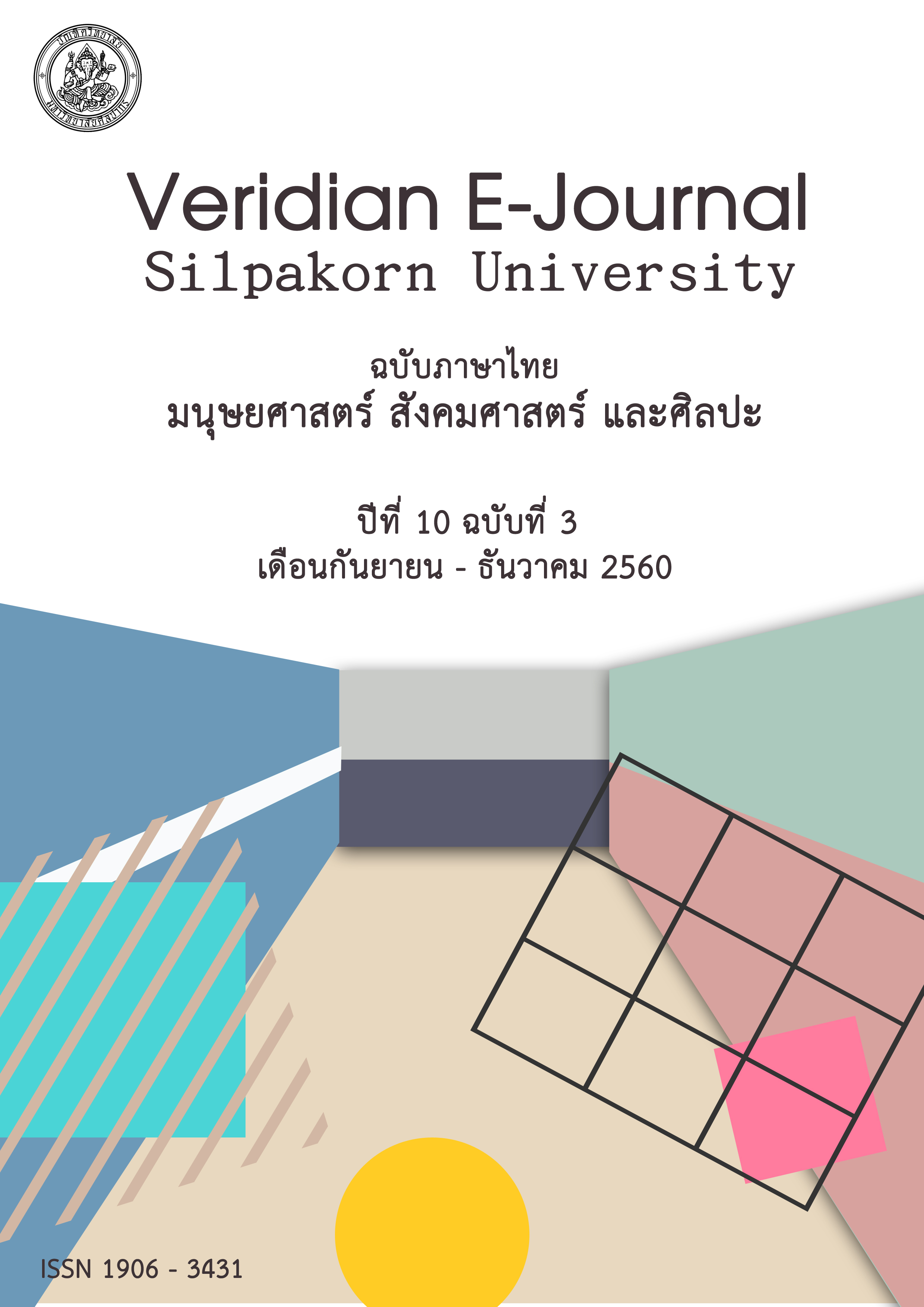ภาวะผู้นำเชิงจริยธรรมของผู้บริหารสถานศึกษา เขตพื้นที่การศึกษาประถมศึกษาลำปาง เขต 3
Main Article Content
Abstract
การค้นคว้าแบบอิสระนี้ มีวัตถุประสงค์ 2 ข้อได้แก่ 1) เพื่อศึกษาระดับภาวะผู้นำเชิงจริยธรรมของผู้บริหารสถานศึกษา ในเขตพื้นที่การศึกษาประถมศึกษาลำปาง เขต 3 ตามทัศนะของครู 2) เพื่อจัดทำข้อเสนอแนะในการพัฒนาภาวะผู้นำเชิงจริยธรรมของผู้บริหารสถานศึกษาในเขตพื้นที่การศึกษาประถมศึกษาลำปาง เขต 3 มีขั้นตอนการศึกษา 2 ขั้นตอน ได้แก่ ขั้นตอนที่ 1 การศึกษาระดับภาวะผู้นำ
เชิงจริยธรรมของผู้บริหารสถานศึกษา ในเขตพื้นที่การศึกษาประถมศึกษาลำปาง เขต 3 ตามทัศนะของครู กลุ่มตัวอย่างที่ใช้ในการศึกษา ได้แก่ ครูในเขตพื้นที่การศึกษาประถมศึกษาลำปาง เขต 3 ในปีการศึกษา 2559 จำนวน 231 คน เครื่องมือที่ใช้ในการศึกษา ได้แก่ แบบสอบถาม วิเคราะห์ข้อมูลโดยใช้ค่าเฉลี่ย และส่วนเบี่ยงเบนมาตรฐาน และขั้นตอนที่ 2 การจัดทำข้อเสนอแนะในการพัฒนาภาวะผู้นำเชิงจริยธรรม
ของผู้บริหารสถานศึกษา กลุ่มเป้าหมายที่ใช้ในการศึกษาเป็นผู้ทรงคุณวุฒิทางการศึกษา ได้แก่ ผู้อำนวยการสำนักงานเขตพื้นที่การศึกษาประถมศึกษา ผู้อำนวยการสถานศึกษา ที่ได้รับรางวัลครุสดุดี จำนวน 5 คน เครื่องมือที่ใช้ในการศึกษา ได้แก่ แบบสัมภาษณ์ วิเคราะห์ข้อมูลโดยการวิเคราะห์เนื้อหา ผลการศึกษาพบว่า
ระดับภาวะผู้นำเชิงจริยธรรมของผู้บริหารสถานศึกษา ในเขตพื้นที่การศึกษาประถมศึกษาลำปาง เขต 3 ตามทัศนะของครู ในภาพรวมอยู่ในระดับมาก โดยเรียงตามลำดับจากมากไปหาน้อย ดังนี้ ด้านจริยธรรมต่อสังคม ด้านจริยธรรมต่อผู้รับบริการ ด้านจริยธรรมต่อผู้ร่วมประกอบวิชาชีพ ด้านจริยธรรมต่อวิชาชีพ และด้านจริยธรรมต่อตนเอง ตามลำดับ
ข้อเสนอแนะในการพัฒนาภาวะผู้นำเชิงจริยธรรมของผู้บริหารสถานศึกษา 1) ด้านจริยธรรมต่อตนเอง ผู้บริหารสถานศึกษา ควรมีการพัฒนาตนเองให้เป็นบุคลแห่งการเรียนรู้อย่างต่อเนื่อง 2) ด้านจริยธรรม
ต่อวิชาชีพ ควรมีความตระหนักในความรับผิดชอบ การวางแผนและติดตามงาน เอาใจใส่ในการปฏิบัติงานและต้องเป็นผู้ที่สร้างความเชื่อมั่นให้กับครู 3) ด้านจริยธรรมต่อผู้รับบริการ ควรให้ความสำคัญกับความคิดเห็นของผู้ปกครองและครูให้มีโอกาสได้เสนอความคิดเห็นและวิธีการปฏิบัติงานที่ตนเองถนัด 4) ด้านจริยธรรม
ต่อผู้ร่วมประกอบวิชาชีพ ต้องเห็นอกเห็นใจ ปฏิบัติตนเป็นกลางไม่เอนเอียงในการที่จะก่อให้เกิดประโยชน์หรือเป็นโทษต่อผู้หนึ่งผู้ใด และ 5) ด้านจริยธรรมต่อสังคม ควรเป็นผู้นำที่ดีในการบริการ พร้อมทั้งเห็นคุณค่าของทรัพยากรในชุมชนและนำมาใช้วางแผนและดำเนินการในสถานศึกษาเพื่อให้เกิดประโยชน์แก่ผู้เรียน
เป็นสำคัญ
This independent study focused on 1) studying the level of ethical leadership for school administrators in Lampang Primary Educational Service Area 3 according to the teachers’ opinions, 2) managing the recommendations in order to develop ethical leadership among school administrators in Lampang Primary Educational Service Area 3. Two steps were conducted the first step was to study the level of ethical leadership for school administrators in Lampang Primary Educational Service Area 3 according to the teachers’ opinions. The samples were 231 teachers working in Lampang Primary Educational Service Area 3, academic year of 2016. The research instrument was questionnaire and the data were analyzed by mean and standard deviation and the second step was to prepare all recommendations from this study in developing develop ethical leadership among school administrators. The subjects of the study were 5 educational experts such as the directors of the Primary Educational Service, the directors of school who were awarded as Honorary Teacher Award. The instrument was the interview form with the content analysis. The results showed that:
The overall opinions of the teachers on the level of ethical leadership for school administrators in Lampang Primary Educational Service Area 3 were at the high level ranked from the highest to the low level as ethics to society, ethics to service receivers, ethics to professional associates, ethics to profession, and self- ethics, respectively.
The recommendations gathered from this study to develop ethical leadership among school administrators were 1) self-ethics: the administrators have to improve themselves to be as continuing learners, 2) ethics to professions: the administrators should realize about the responsibilities, planning, and following up, pay attention on working performance, and build confidence for the teachers, 3) ethics to service receivers, they administrators should give the importance to parental opinions and the teacher have to have the opportunity to express their idea and their work with their own field, 4) ethics to professional associates; the administrators should sympathize, behave for fairness not flavor for anyone ,and 5) ethics to society: the administrators should be the good leaders in delivering services, realize about the resources in communities and use them for planning and work for the highest benefits for the learners.
